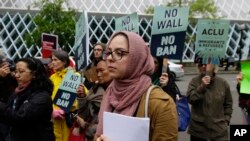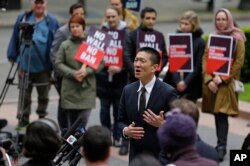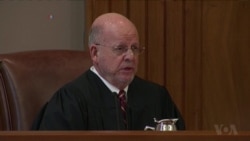A second U.S. appellate court this month is considering whether to uphold the suspension of travel restrictions for the nationals of six countries to the United States, as well as the arrival of refugees.
Three judges from the 9th U.S. Circuit Court of Appeals heard arguments in Seattle on Monday morning, after the government challenged a decision by a judge in Hawaii that paused the most substantive parts of a revised executive order issued by President Donald Trump in March.
The court did not immediately issue a ruling.
At the center of the case is a question of whether the 90-day ban on most travelers from six majority-Muslim countries and a 120-day stop on refugee arrivals is discriminatory and unconstitutional.
"The executive order sets out national security justifications, but how is a court to know whether in fact it's a Muslim ban in the guise of national security justification?" Judge Ronald Gould asked.
The government rescinded a January version of the order, replacing it after lawsuits across the country alleging what was then a seven-country ban on travel disproportionately targeted Muslims. Trump, who called the second order on March 6 a "watered-down" version, until last week maintained a 2015 statement on his campaign website that called for a ban on Muslims coming to the United States.
Acting Solicitor General Jeffrey Wall attempted to distinguish between Trump's words before his inauguration Jan. 20, and his executive orders in the following weeks and months, in the Seattle courtroom.
"People say things on a campaign trail and then they take an oath to uphold the Constitution, they form an administration and they consult with them on the policies that they develop, and we shouldn't start down the road of psychoanalyzing what people meant in the campaign trail," Wall argued.
Attorney Neal Katyal, who represented the plaintiffs, told the judges the president showed a "repeated pattern" of behavior that supports a discriminatory attitude toward Muslims, and a ruling in favor of the government would set a precedent for discrimination.
"This is something new and unusual in which you're saying, 'This whole class of people, some of which are dangerous, we can bar them all,'" Katyal argued.
Monday's hearing followed similar arguments in a Richmond, Virginia, court last week, when a panel of 13 judges in the 4th Circuit Court of Appeals heard arguments regarding a Maryland judge's suspension of the 90-day moratorium on travel from six majority-Muslim countries. The court has not yet ruled in that case.
The administration has to win both cases to fully reinstate the order.
If it loses either case, the next step would be the Supreme Court — a step Trump enthusiastically tweeted in favor of last month.







